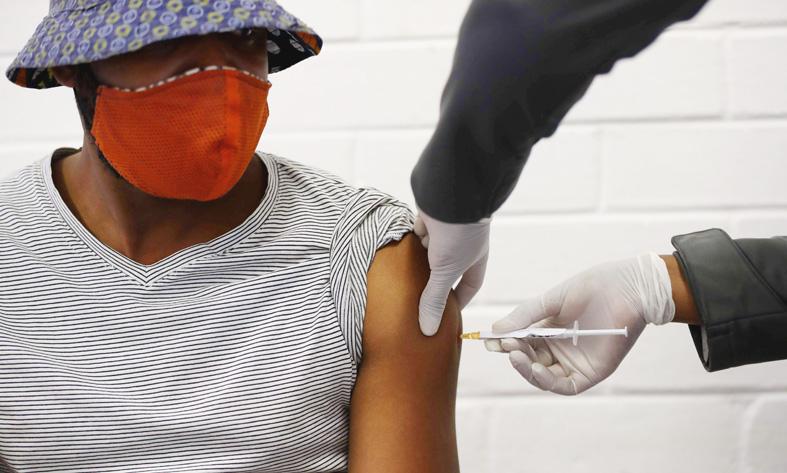The African Union on Wednesday announced that it has purchased 270 million doses of COVID-19 vaccines for the continent from Pfizer and AstraZeneca through the Serum Institute of India, and from Johnson & Johnson.
At least 50 million of the doses are to be available by April to June and the rest are to be delivered before the end of the year, said the African Union chairman, South African President Cyril Ramaphosa.
“From the onset of this crisis, our focus as a continent has been on collaboration and collective effort. We have held steadfastly to the principle that no country should be left behind,” Ramaphosa said in a statement.

Photo: AFP
The purchase agreements were negotiated by the African Vaccine Acquisition Task Team established by the African Union, the statement said.
The news comes as COVID-19 infections are spiking again in parts of Africa.
The continent has surpassed 3 million confirmed cases since the start of the pandemic, with more than 1.2 million in South Africa, where a rapidly spreading variant of COVID-19 makes up most of its new cases.
The acquisition of 270 million doses would complement the 600 million doses expected to be made available to Africa by the Vaccine Global Access Facility (COVAX) platform.
The new purchases and the COVAX doses would provide Africa with about half of the doses that it requires, the Africa Centers for Disease Control and Prevention (Africa CDC) said.
The continent seeks to vaccinate about 780 million people, representing about 60 percent of its population of 1.3 billion.
The Africa CDC has said that 1.5 billion doses are needed for that, assuming two doses per person, at an estimated cost of about US$10 billion.
Financing for individual countries wanting to buy the vaccines is to be available through the African Export-Import Bank, the African Union statement said.
It is hoped that international donors would ensure that more vaccines are provided through COVAX, to reduce any new debt burden on African states, the statement said.
“Given the virulent nature of the COVID-19 pandemic, it is clear that a threat to one nation and continent is a threat to all,” the statement said. “To successfully eradicate the global threat of the disease, it is critical that a majority of citizens of all nations get urgent and equitable access to the COVID-19 vaccines as soon as possible,” it added.
“There is a long road ahead, but as Africa, we are now seeing progress in our shared effort to defeat this disease,” Ramaphosa said.

Chinese President Xi Jinping (習近平) is to visit Russia next month for a summit of the BRICS bloc of developing economies, Chinese Minister of Foreign Affairs Wang Yi (王毅) said on Thursday, a move that comes as Moscow and Beijing seek to counter the West’s global influence. Xi’s visit to Russia would be his second since the Kremlin sent troops into Ukraine in February 2022. China claims to take a neutral position in the conflict, but it has backed the Kremlin’s contentions that Russia’s action was provoked by the West, and it continues to supply key components needed by Moscow for

Japan scrambled fighter jets after Russian aircraft flew around the archipelago for the first time in five years, Tokyo said yesterday. From Thursday morning to afternoon, the Russian Tu-142 aircraft flew from the sea between Japan and South Korea toward the southern Okinawa region, the Japanese Ministry of Defense said in a statement. They then traveled north over the Pacific Ocean and finished their journey off the northern island of Hokkaido, it added. The planes did not enter Japanese airspace, but flew over an area subject to a territorial dispute between Japan and Russia, a ministry official said. “In response, we mobilized Air Self-Defense

CRITICISM: ‘One has to choose the lesser of two evils,’ Pope Francis said, as he criticized Trump’s anti-immigrant policies and Harris’ pro-choice position Pope Francis on Friday accused both former US president Donald Trump and US Vice President Kamala Harris of being “against life” as he returned to Rome from a 12-day tour of the Asia-Pacific region. The 87-year-old pontiff’s comments on the US presidential hopefuls came as he defied health concerns to connect with believers from the jungle of Papua New Guinea to the skyscrapers of Singapore. It was Francis’ longest trip in duration and distance since becoming head of the world’s nearly 1.4 billion Roman Catholics more than 11 years ago. Despite the marathon visit, he held a long and spirited

The pitch is a classic: A young celebrity with no climbing experience spends a year in hard training and scales Mount Everest, succeeding against some — if not all — odds. French YouTuber Ines Benazzouz, known as Inoxtag, brought the story to life with a two-hour-plus documentary about his year preparing for the ultimate challenge. The film, titled Kaizen, proved a smash hit on its release last weekend. Young fans queued around the block to get into a preview screening in Paris, with Inoxtag’s management on Monday saying the film had smashed the box office record for a special cinema